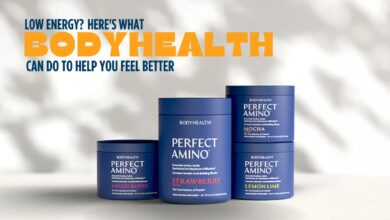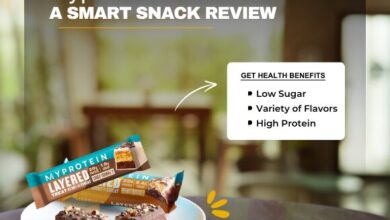Top Protein Snacks to Fuel Busy Days and Balanced Lifestyles
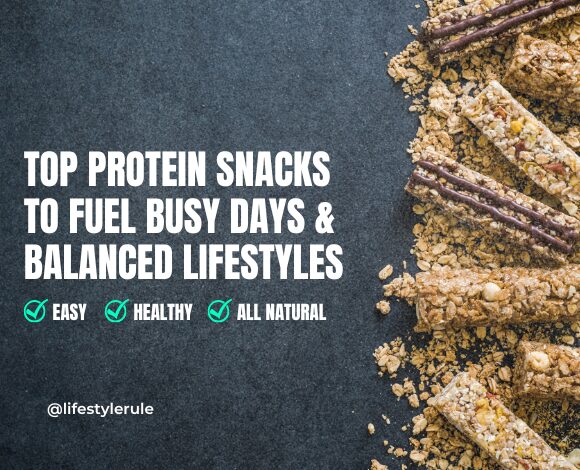
Finding a protein snack that fits into a packed schedule is no longer just about grabbing whatever says “high protein” on the label. Between meetings, workouts, errands, and everything in between, people need something that not only fuels their day but also tastes good, feels satisfying, and aligns with their personal health goals. Convenience matters, but so does balance—and the right option can make a noticeable difference in how the day feels.
The challenge is that not all protein bars live up to their promises. Some are loaded with sugar, others rely heavily on artificial ingredients, and a few just miss the mark on taste or texture. What works for one person may fall short for another, especially when preferences and dietary needs vary so widely. With so many styles—from clean and minimalist to dessert-inspired—it helps to understand how each one fits into everyday life.
Choosing a protein snack isn’t just a matter of counting grams of protein or cutting carbs. It’s about how that snack fits into a moment—before a meeting, after a workout, or between meals—and how well it supports energy, satisfaction, and consistency over time.
What Makes a Protein Snack Fit for a Balanced Lifestyle
A protein bar should do more than meet a nutritional quota—it needs to actually work in the context of real life. That means providing enough fuel without relying on fillers, being satisfying without being overly sweet, and fitting into a daily routine without making it feel like a chore. The best options are those that strike a smart balance between quality ingredients, nutritional value, and an experience that people actually look forward to.
Nutrient Density and Ingredient Quality
A smart protein snack offers more than just high protein—it delivers balanced nutrition that actually supports energy and satisfaction. Ingredients matter just as much as the numbers on the label.
Here’s what to look for in a well-balanced bar:
- At least 10–20 grams of protein to support energy and muscle recovery
- No more than 5–8 grams of added sugar to avoid energy crashes
- 3–5 grams of fiber to promote fullness and digestion
- Whole-food ingredients like nuts, seeds, or oats over artificial fillers
While one bar might boast impressive protein levels, it’s just as important to check what else comes with it—like added sweeteners or low-quality oils that can undermine the overall benefit. Quality counts just as much as quantity.
Taste and Texture as Long-Term Factors
No matter how healthy a bar claims to be, if it tastes off or has an unpleasant texture, it’s unlikely to become a consistent part of someone’s routine. Flavors that resemble real food and textures that feel familiar—like soft and chewy or lightly crisp—tend to keep people coming back. Think of someone grabbing a bar between meetings or after a workout. If that snack feels rewarding and easy to eat, it becomes a habit. If it feels like a chore, it gets left behind.
So let’s break down four of the most talked-about protein snack brands and see how each one holds up when it comes to taste, nutrition, and real-life convenience.
1. Myprotein
Myprotein has become a go-to for those who want high protein content without compromising on taste or nutrition. Their Layered Protein Bar is especially popular thanks to its indulgent, dessert-like texture and impressive macros. Designed to support muscle recovery, fuel long days, and curb cravings, it’s ideal for anyone juggling a packed schedule with personal fitness goals.

A Texture That Feels Like a Treat
Biting into this bar doesn’t feel like a chore—it’s layered for a reason.
- Six Layers: Each bar includes gooey caramel, protein crispies, and a smooth chocolate coating, making it feel more like a candy bar than a supplement.
- Soft Yet Substantial: It’s chewy without being too dense, which makes it easy to enjoy on the go.
- Flavor Range: Options like Chocolate Brownie, Cookies & Cream, and Birthday Cake mean you can switch it up without getting bored.
This bar works well when you want a treat without totally derailing your day.
Smart Nutritional Profile
While it’s big on flavor, the nutrition still meets the needs of an active lifestyle.
- 20g Protein: High enough for muscle recovery or meal replacement.
- Low Sugar: Only 2g per bar helps avoid that late-afternoon crash.
- 7.4g Fiber: Supports digestion and keeps you feeling full longer.
- Under 250 Calories: A balance of indulgence and function.
These macros make it one of the most well-rounded bars on the market.
How It Supports Daily Nutrition
Even with well-planned meals, gaps happen—and that’s where this bar comes in. It helps bridge those in-between moments with real nutrition, not just empty calories. The balance of protein and fiber keeps you full longer, reducing the urge to snack on less nutritious options. It’s also a simple way to stay consistent with your intake, especially on busy days when meal prep isn’t realistic. Instead of reaching for something random, you’ve got a snack that’s already working for your goals.
2. RXBAR
RXBAR is built on a philosophy of real ingredients and no surprises. Each bar is made with a handful of whole foods you can recognize and pronounce—offering a direct, no-frills approach to snacking that appeals to people who care about what they’re putting into their body. The packaging says it all, and the formula follows through.

Ingredient Transparency and Simplicity
What sets RXBAR apart is how it leads with its ingredients—literally. The front of each bar lists its core components in bold text, reinforcing a clean-label commitment. Most bars contain:
- Egg whites for protein
- Nuts for texture and healthy fat
- Dates to bind and naturally sweeten
There are no added sugars, no artificial flavors, and no unnecessary fillers. This minimal ingredient list supports dietary preferences like paleo or Whole30 and makes RXBAR an easy pick for clean eaters.
Texture, Flavor Range, and Functional Use
These bars are dense, chewy, and intentionally simple in texture. They don’t have a coated layer or soft center—instead, the consistency is uniform and slightly sticky, giving them a more natural feel. Flavor options range from the savory-sweet Chocolate Sea Salt to the classic Peanut Butter and fruity Blueberry. They work well:
- As a fast, on-the-go breakfast
- Between meals when you need something substantial
- As a travel snack that won’t melt or crumble
The experience is more functional than indulgent, which is part of its appeal.
RXBAR Product Extensions
While the core bar remains its flagship, RXBAR has introduced several product extensions that stick to the same ingredient-first values:
- RXBAR Minis – smaller bars for portion control or light snacking
- RX Nut Butter – single-serve pouches combining nut butter and egg whites
- RX A.M. Oats – quick-prep oatmeal cups with added protein
Each addition is designed for a different moment in the day, giving fans more flexibility while staying true to the brand’s whole-food identity.
3. Barebells
Barebells blends dessert-like taste with practical nutrition, offering a protein bar that doesn’t feel like a compromise. With a sleek look, candy-bar texture, and indulgent flavors, it’s a popular choice for those who want something sweet without the sugar overload. Despite its treat-like appeal, it delivers serious protein and fits easily into an active routine.
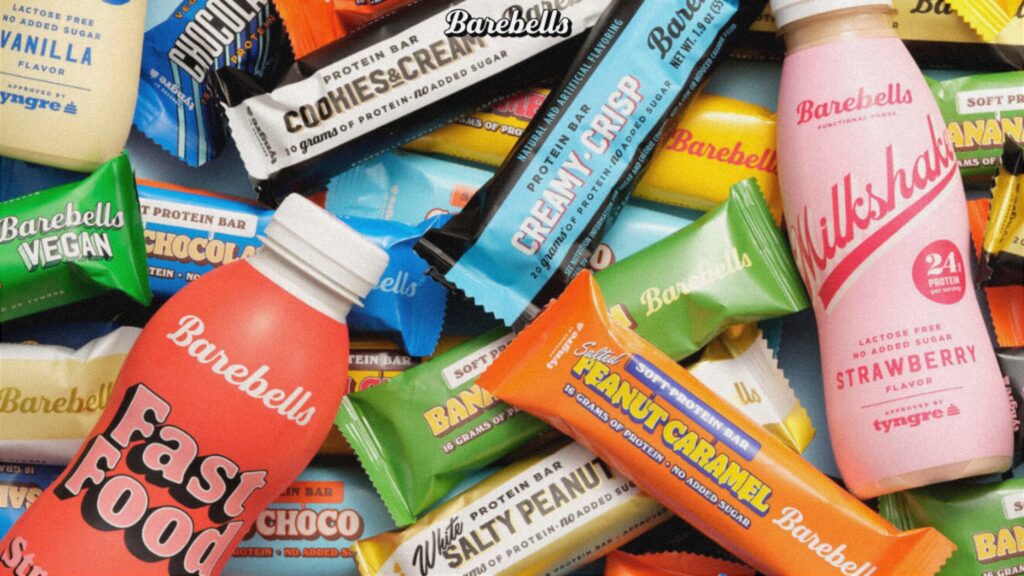
Dessert-Inspired Flavors with Functional Nutrition
What sets Barebells apart is how closely it mimics a candy bar—without the typical drawbacks. Flavors like Cookies & Cream, Salty Peanut, and Caramel Cashew offer rich, smooth textures and satisfying sweetness, all with about 20 grams of protein per bar. Instead of added sugar, Barebells uses sweeteners like maltitol to maintain flavor without spiking sugar content. The result is a bar that feels indulgent but stays aligned with everyday fitness and wellness goals.
Portability and Real-World Convenience
These bars are sturdy, mess-free, and built to travel. They don’t melt in warm weather, don’t crumble in your bag, and come individually wrapped in sleek, durable packaging. Whether you’re keeping one in your desk, gym bag, or car, Barebells makes it easy to always have a satisfying snack on hand.
Global Appeal and Product Variety
Originally launched in Sweden, Barebells has grown into a global brand with a diverse range of products. In addition to its core protein bars, it now offers:
- Milkshakes – high-protein, low-sugar drinks in flavors like Vanilla and Chocolate
- Vegan Bars – plant-based options with the same dessert-like texture
- Limited Edition Flavors – seasonal and special drops that keep the lineup fresh
Its international success reflects a growing demand for protein snacks that deliver on both taste and function.
4. Quest Nutrition
Quest Nutrition is well-established in the fitness and nutrition space, known for creating high-protein, low-carb snacks that align with structured eating plans. Whether the goal is building muscle, managing macros, or staying fueled without added sugar, Quest offers a wide range of products designed to support active lifestyles. It’s a brand that speaks directly to performance-focused consumers who want convenience without compromise.
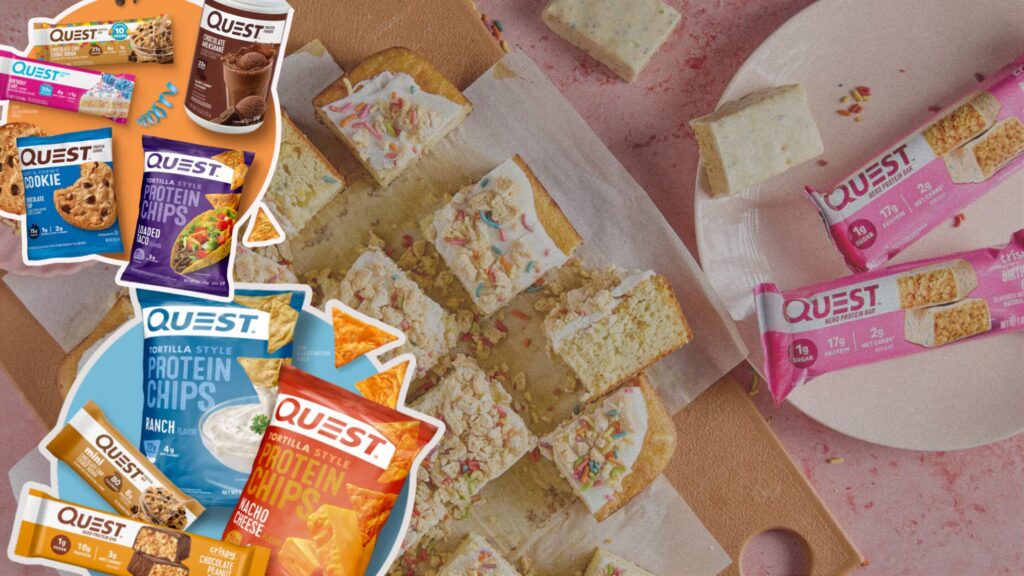
Macros That Fit Active Lifestyles
Quest bars are engineered to meet the needs of those tracking protein and carbs closely. Each standard bar contains:
- 20–21 grams of protein
- 1–3 grams of net carbs
- 12–15 grams of fiber, depending on the flavor
This macro profile supports common nutrition goals like muscle recovery, satiety, and glycemic control, making Quest particularly popular among keto dieters, bodybuilders, and anyone focused on high-protein intake with minimal sugar impact.
Flavor Formats and Product Expansion
What started with protein bars has expanded into an entire line of snacks designed to fit seamlessly into everyday eating. Quest now offers:
- Protein Chips in flavors like Loaded Taco and Sour Cream & Onion
- Soft-baked Cookies and Peanut Butter Cups for dessert-style snacks
- Frozen Pizzas and Pasta that are high in protein and lower in carbs than traditional options
This range allows for variety without straying from dietary goals, making it easier to maintain consistency over time.
Taste Experience and Sweetener Considerations
Quest uses sweeteners like sucralose and erythritol to keep sugar content low. While many enjoy the bold, candy-like flavors, some find the sweetness level high or notice an aftertaste, especially in bars and cookies. Those used to sugar alternatives often find the taste acceptable, while others may need time to adjust or prefer select products within the range.
5. ALOHA
ALOHA positions itself as more than a snack—it’s a wellness choice rooted in clean, plant-based nutrition and mindful living. Every product is designed with care, using organic ingredients and sustainable practices that appeal to those who prioritize both health and values in their daily routine. With a fully vegan, allergen-friendly lineup, ALOHA has become a go-to for consumers seeking balanced, trustworthy protein snacks.
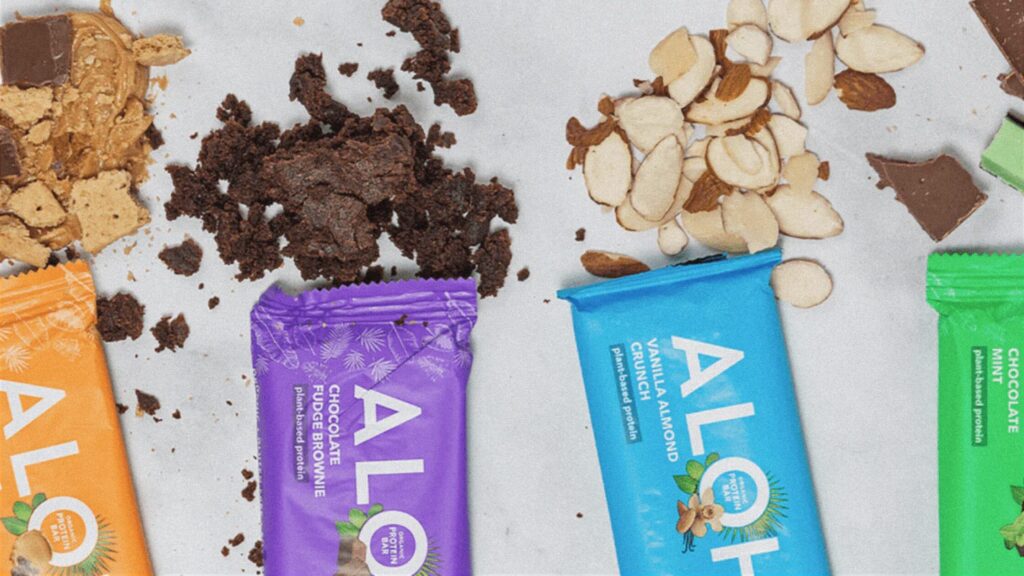
Organic and Allergen-Friendly Formula
ALOHA bars are certified USDA Organic, non-GMO, and fully plant-based, with a formula that avoids common allergens. They are:
- Soy-free
- Gluten-free
- Dairy-free
Protein sources include pumpkin seed and brown rice, offering a complete amino acid profile while remaining easy to digest. Each bar is lightly sweetened with organic monk fruit and tapioca, providing a cleaner alternative to sugar or sugar alcohols.
Flavor and Texture for Gentle Snacking
ALOHA bars have a soft, cake-like texture that’s smooth and easy to eat—ideal for those who prefer a lighter, less chewy experience. Flavors such as Peanut Butter Cup, Chocolate Mint, and Vanilla Almond Crunch are subtle but satisfying, without overwhelming sweetness. Many reach for them as:
- A midday snack
- A light meal companion
- A dessert alternative with better macros
This gentle profile makes them suitable for everyday snacking without digestive heaviness.
Sustainability and Product Range
Beyond clean nutrition, ALOHA emphasizes sustainability in both packaging and sourcing. Its compostable wrappers reflect a broader commitment to eco-conscious practices. The brand also offers a growing lineup beyond bars, including:
- Protein drinks – creamy, plant-based shakes in flavors like Iced Coffee and Chocolate Sea Salt
- Variety packs – designed for flexible, grab-and-go snacking
ALOHA blends function, flavor, and purpose—making it a natural fit for those who want their food to reflect how they live.
Common Mistakes When Choosing Protein Snacks
It’s easy to get caught up in bold packaging or trendy claims, especially when a snack promises to support health goals. But not all protein bars are created equal—and making the right choice requires more than just glancing at the front of the wrapper. Understanding what actually goes into a bar can help avoid the frustration of snacks that don’t satisfy, disrupt digestion, or don’t align with your nutrition needs.
1. Falling for Buzzwords
Words like “natural,” “fit,” or “clean” can sound reassuring but often don’t tell the full story. Many bars use these terms while still including syrups, artificial flavors, or ultra-processed ingredients. Without reading the actual ingredient list or checking the nutrition label, it’s easy to assume a product is healthier than it really is. Buzzwords are marketing tools—not a substitute for real transparency.
2. Ignoring Sugar Sources
Not all sugars are labeled the same way. Some bars include added sugar in the form of cane sugar or syrup, while others rely on sugar alcohols like erythritol or maltitol to cut calorie content. While sugar alcohols may help reduce total sugar, they can cause bloating or digestive discomfort for some people. Recognizing these ingredients and understanding how your body reacts to them is key to finding a snack that feels as good as it looks.
When to Eat Protein Snacks for Best Results
While protein bars are designed for convenience, the timing of when you eat them can influence how well they support your goals. Whether you’re fueling a workout, curbing afternoon cravings, or stretching time between meals, using them intentionally makes a difference.
Before and After Workouts
Protein needs shift depending on activity. Before a workout, a bar with some carbs—like those containing oats or dates—can provide steady energy without feeling too heavy. After a workout, the focus shifts to recovery, and bars offering at least 15–20 grams of protein help repair muscles and restore energy.
- Pre-workout: A lighter bar like ALOHA works well for lower-intensity movement.
- Post-workout: A Quest bar delivers high protein with low net carbs, ideal for muscle recovery.
Choosing based on timing helps the snack work for you—not just fill a gap.
Smart Snacking Strategies
Protein bars also shine between meals, especially during long stretches of work or travel. To build a more balanced snack, pair a bar with a piece of fruit or raw veggies—this adds natural fiber and freshness. Mid-morning or late afternoon are popular times when energy tends to dip, and a bar can help maintain focus without the crash of sugary snacks.
Used thoughtfully, protein bars become more than a quick fix—they support rhythm and routine throughout the day.
Quick Comparison Overview
| Bars | Protein | Sugar | Flavor | Best Use | Ideal For |
|---|---|---|---|---|---|
| Myprotein | 20g | Low (2g) | Layered, indulgent | Anytime, cravings | Busy routines, balanced snacking |
| RXBAR | 12g | No added (dates) | Natural, chewy | Morning, travel | Clean eaters, paleo-style diets |
| Barebells | 20g | No added (maltitol) | Dessert-like, smooth | Post-gym, cravings | Fitness-minded, sweet snackers |
| Quest | 20–21g | Low (artificial) | Bold, candy-like | Post-workout, meal | Keto, high-protein diets |
| ALOHA | 14g | Natural only | Mild, cake-like | Midday, light snack | Plant-based, wellness-focused |
Conclusion
The most effective protein bar is one that fits naturally into your routine. It should offer real nutritional value, keep you satisfied, and taste good enough to look forward to. From texture and flavor to ingredient quality, the right choice balances convenience with intention. When a bar aligns with your needs, it becomes more than just a snack—it supports consistency and energy throughout the day.
Instead of chasing trends or labels, focus on what truly works for your lifestyle. A bar that helps you feel better, think clearer, and avoid energy crashes is the one worth keeping around.


